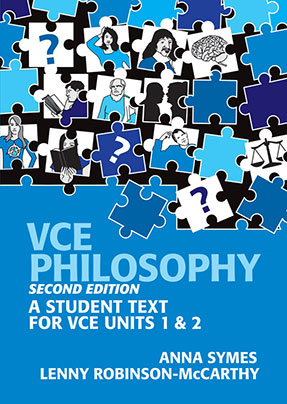With its lively and stimulating approach,
this book is an essential classroom companion
and the perfect student introduction to
the exciting world of philosophical inquiry.
The Book
Building on the success of the first book ever written exclusively for
students of VCE Philosophy, is VCE Philosophy: A Student Text for
VCE Units 1 & 2. This second edition is fully updated to meet the
demands of the new VCE Philosophy Study Design and includes
studies of recommended texts, activities, discussion questions and ideas for assessment – everything you need to teach the new Unit 1 and 2 course successfully.
Drawing on decades of teaching and assessing experience, the
authors invite students to actually do philosophy, while at the same
time providing comprehensive grounding in all the Key Knowledge
and Key Skills outlined in the latest VCE Philosophy Study Design.
Through a variety of engaging classroom tasks and discussion
activities, students are encouraged to critically reflect on arguments
and ideas, and develop skills of reasoning, analysis and evaluation.
Close examination of primary texts is a strong feature,
reflecting the new emphasis on this aspect of Philosophy across all
Units.
Teachers will appreciate the wealth of suggestions for lesson content,
assessment tasks, further resources, and advice on course design and
unit planning.
Contents
Chapter 1 – Introduction to philosophy
• What is Philosophy? Why might we study it?
• Approaches to philosophical discussion
Chapter 2- Reasoning and logic
• Identifying arguments
• Standard form representation
• Other tools for argument
• Evaluating arguments: logical and factual assessment
• Thinking about judgments: cognitive bias
• Further tools for evaluating arguments: rhetorical ploys and fallacies
Chapter 3 – Metaphysics
• Materialism and idealism
• The material mind
• Free will and determinism
• The existence and nature of God
• Time
Chapter 4 – Epistemology
• Knowledge
• The possibility of a priori knowledge
• Science
• Objectivity
Chapter 5 – Ethics and moral philosophy
• The foundations of morality
• Moral psychology
• Right and wrong
Chapter 6 – Further problems in value
theory/other forms of value
• Rights and justice
• Liberty and anarchy
• Aesthetic value
• Interpretation of art works
Chapter 7 – Advice for teaching and
learning with this book
• Designing your Units 1 and 2 course
• Suggestions for student assessment
The Authors
Dr. Lenny Robinson-McCarthy (BA
[hons], Dip. Ed, PhD) has taught VCE
Philosophy at Preshil in Melbourne since
2001. She has also worked for the VCAA
in areas relating to VCE Philosophy
curriculum development and assessment
and as a private tutor for students of VCE
and IB Philosophy. In 2008 Lenny qualified
as a Philosophy for Children educator and,
under the auspices of VAPS, has designed
and run workshops in Community of
Inquiry for both primary and secondary
school teachers. Lenny is also a published
author of academic and creative works.
Anna Symes (B.A., B.Mus., Dip.Ed, Grad.
Cert.Gifted Ed.) has more than 20 years of
teaching experience in primary, secondary and
tertiary settings. Over a decade of teaching
at St Leonard’s College, Melbourne, she
established the school’s Philosophy program
and presented inservice sessions to teachers
around Victoria. Anna has been a consultant
to the VCAA in the development of VCE
Philosophy Curriculum since 2006 and has
worked on state and international examination
panels since 2001. She is currently tutoring on
Educational Philosophy and Psychology at the
University of Melbourne.
Gallery
Click thumbnails for a larger image.
|
